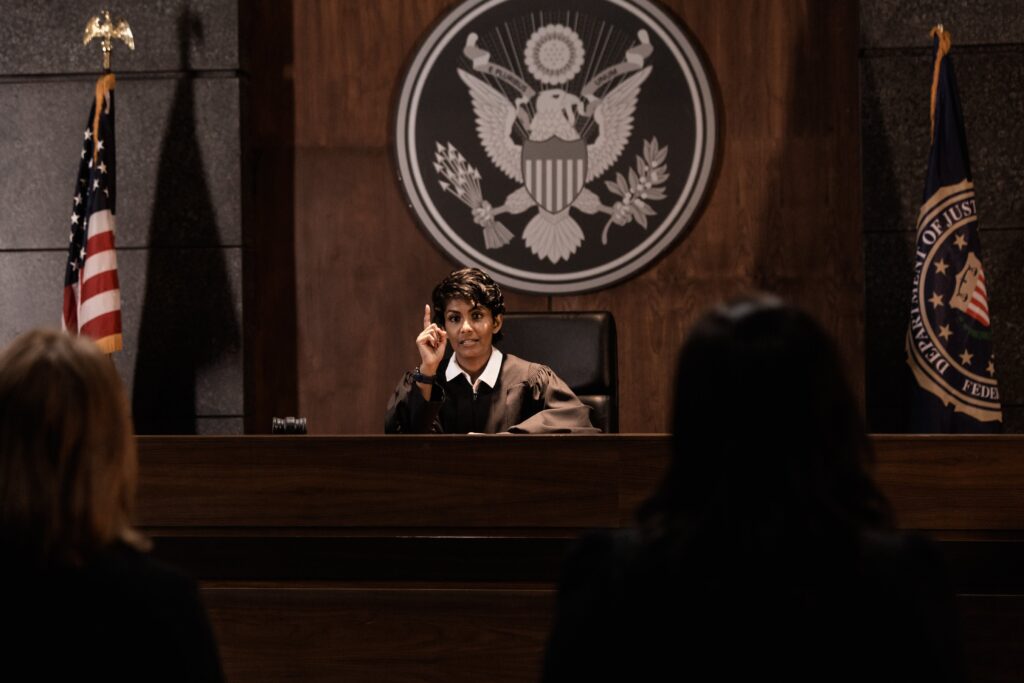Michigan Judges
Judges in Michigan can be elected or appointed by the Governor. If a judge is appointed, they will have to run for reelection at the end of their term in office.

Structure of Federal and State Judges in Michigan
The United States has two separate judicial systems, state and federal. State courts handle criminal and civil cases that primarily impact only Michigan residents. In federal court, cases generally involve the United States as a party, cases involving violations of federal law or the Constitution, and bankruptcy cases. There are Michigan judges who serve in both state and federal courts.
State Courts in Michigan
The state judicial system has five key parts: the District Court, Circuit Court, Probate Court, Court of Appeals, and the Michigan Supreme Court. District Court judges preside over civil lawsuits for under $25,000.00, landlord-tenant cases, traffic infractions, small claims, and state law and ordinance misdemeanors (crimes punishable by one year or under), and the initial stages of felony cases (arraignments and preliminary examinations for crimes punishable by more than one year).
Circuit and District Court Judges in Michigan
In the Circuit Courts, Michigan judges handle felony cases, family law (domestic relations, custody, divorce, child support), civil lawsuits with an amount in controversy exceeding $25,000.00, child protective proceedings, juvenile delinquency, etc. The juvenile division of a circuit court handles neglect and abuse allegations and juvenile delinquency. Juvenile delinquency means violations of criminal laws by children under the age of 16.
Michigan Court of Appeals
The Michigan Court of Appeals hears cases where someone is dissatisfied with the ruling of a circuit court judge or a jury. In most cases, the party that loses a legal argument in a Circuit Court can appeal to the Michigan Court of Appeals. Three judges preside over these appeals. A decision agreed to by two or all three judges is called the “majority opinion” and is the court’s ruling.
Michigan Supreme Court
The highest court in Michigan is the Michigan Supreme Court, and a Supreme Court judge is referred to as a “justice.” There are seven justices in the Michigan Supreme Court, and the court generally hears cases where a party is dissatisfied with the Michigan Court of Appeals ruling. The court’s ruling is the decision that is agreed upon by the majority of the justices.
Michigan does not have a public defender system for indigent defendants; however, those who cannot afford privately retained lawyers can seek court-appointed counsel. Good, affordable legal representation is available for those seeking a criminal defense lawyer.

Federal Courts in Michigan and the United States
The federal court system has three primary levels. The lowest level is the United States District Court, which has the initial jurisdiction over most lawsuits and criminal matters involving federal law and crimes against the United States. United States District Court judges review petitions, hear motions, hold trials, and issue injunctions. U.S. District Court judges, like Michigan judges, are called “trial judges.”
The United States Court of Appeals is divided into 12 circuits, which are frequently referred to as federal circuit courts. Michigan is in the Sixth Circuit. The circuit courts are appellate courts; they do not handle jury trials. Generally, three judges preside over federal appeals; however, a limited number of cases are heard by all of the Circuit judges simultaneously.
The United States Supreme Court
The United States Supreme Court is the highest court in the country and has the final say on any issue related to federal law. Most cases filed in the Supreme Court are appeals, but the Court has original jurisdiction over certain cases. There are nine justices on the Supreme Court, and they decide cases together. The majority decision is considered the court’s ruling.

Additional Information Regarding Courts and Attorneys
If you need help finding a lawyer to help you in any area of the law, please call us for a free consultation at (248) 263-6800. Our lawyers have decades of experience successfully representing thousands of clients in all courts in Michigan. We have extensive experience with state and federal judges throughout Michigan. Judges and prosecutors know that when our team walks into the courtroom, we will do whatever it takes to turn the tables to our client’s advantage. Through a unique and powerful team approach, we are able to provide clients with consistent and extraordinary results unobtainable by many lawyers in Michigan.
Call us today at (248) 263-6800 for a free consultation or complete an online Request for Assistance Form. We will contact you promptly and find a way to help you.
We will find a way to help you.
We Are Not Afraid to Win!
Michigan Judges
- 37th District Court John Chmura – Warren
- 37th District Court Matthew Sabaugh – Warren
- 37th District Court Suzanne Faunce – Warren
- 37th District Court Michael Chupa – Warren
- 39th District Court Joseph Boedeker – Roseville
- 39th District Court Kathleen Tocco – Roseville
- 39th District Court Marie Hakim – Roseville
- 41b District Court Carrie Fuca – Clinton Township
- 43rd District Court Joseph Longo – Ferndale
- 43rd District Court Brian Hartwell – Hazel Park
- 43rd District Court Keith Hunt – Madison Heights
- 45b District Court Michelle Friedman – Appel
- 45b District Court Jamie Horowitz – Oak Park
- 46th District Court Cynthia Arvant – Southfield
- 47th District Court James Brady – Farmington Hills
- 47th District Court Marla Parker – Farmington Hills
- 48th District Court Diane Dagostini – Bloomfield Hills
- 48th District Court Marc Barron – Bloomfield Hills
- 52-1 District Court Travis Reeds – Novi
- 52-1 District Court David Law – Novi
- 52-2 District Court Kelley Kostin – Clarkston
- 52-4 District Court Kirsten Nielsen Hartig – Troy
- 51st District Court Richard Kuhn Jr – Waterford Township
- 51st District Court Todd Fox – Waterford Township
- 52 4 District Court Maureen McGinnis – Troy








